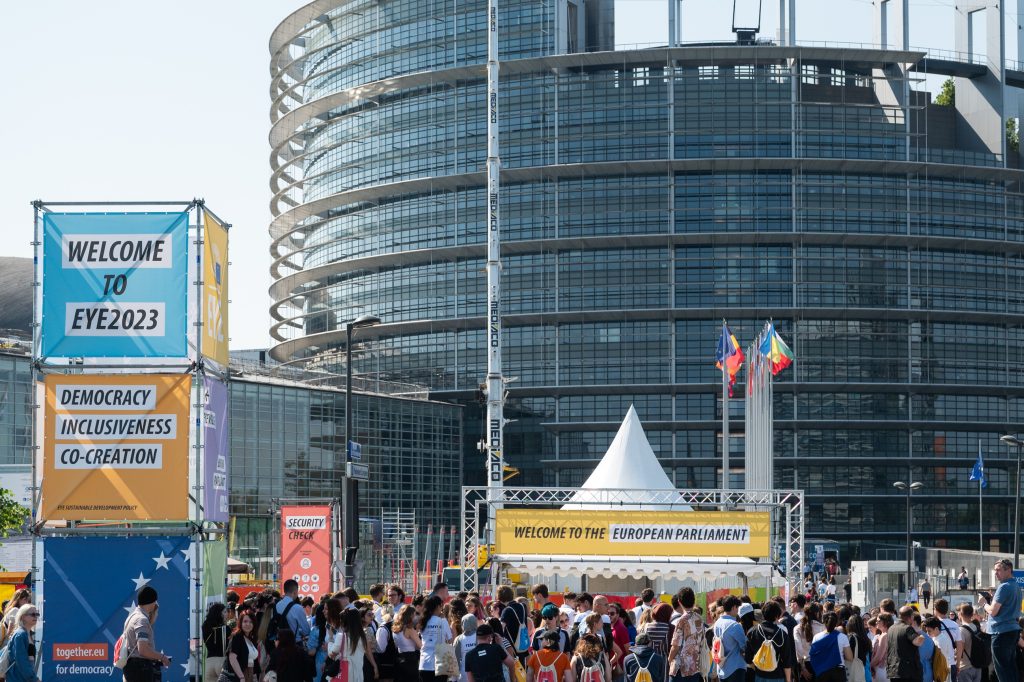
Illustration by Daniela Nunes
What Matters to Europe's Youth?
By Emma Louisa Neugebauer
 Eurobarometer Youth Survey
Eurobarometer Youth Survey
The Eurobarometer Youth Survey, commissioned by the European Parliament, provides valuable insights into the political priorities and attitudes of young Europeans towards the EU.
This youth survey, conducted in September and October of last year, captured the perspectives of nearly 26,000 individuals aged 16 to 30 across all 27 EU member states. The findings offer a comprehensive picture of the values, political participation, and media consumption habits of Europe’s younger generation, alongside their views on the EU's role in tackling key societal challenges.
What are the political priorities of young people?
Young Europeans place a high value on fundamental democratic principles. Over 40% of respondents cited the protection of human rights, democracy, peace, and freedom of speech and thought as the most important values the EU should uphold. Gender equality emerged as another significant priority, with 33% of women highlighting it as crucial compared to only 20% of men, reflecting the importance of advancing gender equity in European politics.
Economic concerns are central to young people’s priorities, with 40% of respondents identifying the rising prices and the cost of living as key challenges that should take priority in the EU's agenda over the next five years. Climate change and environmental protection are also major concerns, with around a third of the survey participants emphasising the urgency of addressing these issues at EU level.
Attitudes toward defence and security varied based on geographic location. While 21% of respondents across the EU considered defence and security as a priority, the figure was much higher in countries bordering Ukraine, such as Poland (33%) and the Czech Republic (36%), where geopolitical tensions have made these issues particularly salient.
Does the EU benefit European youth?
The survey also highlighted that many young Europeans appreciate the opportunities that the EU provides, particularly in terms of studying abroad, volunteering, and travelling. The majority of respondents as key ways in which the EU positively influences their lives cited these reasons. Additionally, improved cooperation between member states and the protection of peace and security were also seen as significant benefits of EU membership.
Support for the EU’s current functioning remains relatively strong, with nearly one-third of respondents expressing positive views of the EU, and another third showing general support. Respondents living in larger towns and cities (36%) tended to be more favourable towards the EU compared to those in rural areas (28%). National variations were also apparent, with Portugal seeing 50% of respondents in favour of the EU, whereas Cyprus recorded the lowest approval rate at just 15%.
Political Participation: Voting, activism, and political engagement
Young Europeans engage in a variety of political activities, with voting being the most common form of participation. Nearly 39% of respondents stated they had voted in local, national or European elections, while 26% reported signing or creating a petition. Other forms of engagement, such as volunteering in political campaigns or boycotting products for ethical reasons, also featured prominently in the survey results, with countries like Denmark, Slovakia, Cyprus and Finland standing out for their high levels of activism.
Nevertheless, there are different barriers to political participation. A significant proportion of respondents who have never contacted a politician (30%) cited the belief that doing so would not make a difference as a reason for their disengagement. Additionally, 23% felt that decision-makers do not listen to people like them, while 18% expressed a lack of interest in the political process. Notably, a quarter of these respondents from Cyprus and Malta felt that the language used in political discourse was too complex to understand.
Far from the polling station
While many young people do participate in political actions such as voting, others remain disengaged due to perceived challenges, such as the lack of relatable candidates, lack of information, or general distrust in politics. For example, in Greece, 36% of non-voter respondents cited other commitments as a reason for not voting in the European Parliament elections, while in Finland, 44% of surveyed non-voters felt they lacked sufficient information to make an informed decision.
Media consumption: Social media as a primary information source
Social media plays a central role in how young Europeans stay informed about political and social issues. A significant 42% of respondents reported using social media platforms to gather information, with Instagram (47%), TikTok (39%), and YouTube (37%) emerging as the most popular platforms. Social media usage for political engagement is particularly prevalent among younger age groups, especially those aged 16-24.
Television and online news outlets also remain important sources of political information, with 39% and 26% of respondents, respectively, relying on these channels. Country-specific variations in media consumption habits were also observed, with Denmark, Spain, and Hungary exhibiting particularly high rates of social media usage for political and social topics.
Attitude towards disinformation and artificial intelligence
The issue of misinformation remains a significant concern for young Europeans, with 44% of respondents reporting frequent exposure to disinformation or fake news. However, 18% of young people felt highly confident in their ability to recognise disinformation, and another 52% expressed some degree of confidence. Men and older respondents generally felt more confident in identifying fake news.
The survey also revealed an increasing usage of artificial intelligence (AI) tools among young people. About 57% of respondents reported using AI, primarily for educational purposes such as studying and research (36%). AI is also used for entertainment and personal organisation, with particular popularity in countries like Romania, Denmark, and Belgium.
 Empowering Youth Participation
Empowering Youth Participation
If you are looking for opportunities to encourage youth participation, do not miss the youth initiatives that the European Parliament offers to young individuals, educators and youth organisations. Let’s discover 5 of them:
The EYE

For this sixth edition, the EYE Village programme will be coordinated by the European Youth Forum, as a space where creativity meets activism, with activities co-created by youth and civil society organisations, ensuring representation and a plurality of perspectives.
The Local EYEs
The EYE also travels beyond Strasbourg in the so-called Local EYEs, organised in the member states by youth groups with the support of their local European Parliament Liaison Offices. These regional events, co-funded by the European Parliament, allow young people to engage in discussions and activities tailored to their local context, while still fostering a sense of connection to broader European issues. Recent Local EYEs took place in Berlin, Vilnius, Forli, and Brežice, helping young people engage with European democracy at a regional level.
The European Charlemagne Youth Prize
This award is given every year to youth-led projects that foster democracy, promote active citizenship and bring communities together. It celebrates the powerful work that young people aged 16-30 do every day to shape a shared European identity and make a lasting impact on Europe’s future. You can already discover the 27 national winners of the European Charlemagne Youth Prize 2025!
Euroscola
The Euroscola programme offers young Europeans the chance to experience the role of a Member of the European Parliament for a day. Participants gather in the Parliament’s chambers in Strasbourg to debate, vote, and pass resolutions on real European issues, gaining a practical understanding of how EU politics work.
Educational offer
The European Parliament is also working to enhance educational tools for teachers and educators, helping them make European Union affairs more accessible to young people. Through these efforts, the EP aims to encourage active citizenship and increase youth involvement in European democracy.
Find out more about the European Parliament youth offer at the Youth Hub!
Emma Louisa is a communication graduate from Berlin and Cape Town, currently a trainee at the European Parliament’s Youth Outreach Unit.


